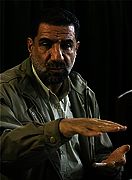Former Guard Commanders Respond to Ahmadinejad
» Kowsari: Guards Assets Have Military Dimension
Last week, the head of Iran’s government Mahmoud Ahmadinejad counseled the Revolutionary Guards Corps (IRGC) to sell its acquisitions and real estate assets to meet its budgetary and financial needs. This week, Guard commanders responded by saying no. A Majlis representative who used to be a senior military Guards commander attributed the issue to the disagreements between Ahmadinejad and Majlis speaker Ali Larijani and stressed that “IRGC assets have a military Dimension.”
Former Guard commander General Mohammad Ismail Kowsari told a weekly newspaper belonging to the ruling Principlists that “It was not clear based on what information Mr. Ahmadinejad has said that the Guards had idle assets that should be relinquished. Even though I have been away from the Guards for the past six or seven years, I doubt the IRGC has any idle assets.”
He further said, “Most of IRGC’s assets and belongings have a military dimension and it is not as if that we as Majlis representatives have a list of IRHC items and assets,” questioning what Ahmadinejad had said.
Speaking to weekly Matn (meaning content), which is close to Mostafa Pour-Mohammadi, the former deputy minister of intelligence when Ali Falahian was minister of the interior but who was subsequently removed by Ahmadinejad, Kowsari said Ahmadinejad’s suggestion about IRGC’s assets was the result of the differences the president had with Majlis speaker Ali Larijani. Pour-Mohammadi is currently the head of the State Inspectorate Organization.
In the interview, Kowsari further said, “At a meeting on the rebuilding of the Khatam Reconstruction base, both Mr. Ahmadinejad and Mr. Larijani were present and the latter asked the IRGC to take action to reinvigorate the economy. IF Mr. Ahmadinejad had anything to say, why did not engage in the conversation then?”
“The IRGC is a revolutionary force and has repeated announced its readiness to help, in the direction of the constitution. This has always been the position of the force. Till now whatever Mr. Ahmadinejad has asked the Guards they have provided him. If he has not been able to take care of something, that has nothing to do with the Guards,” he continued.
Kowsari also claimed that when he was in the force, the IRGC had so many shortages that it had no alternative but to engage in some construction activities to meet its needs. “When I was there, there were many shortages,” he said.
Kowsari was a senior IRGC commander of the 27th Mohammad Rasoolalah, the deputy commander of the Tehran Sarolah force, the operational commander of the Tehran IRGC Force, the deputy commander of the Sarolah Force, the commander of the security bureau of the General Staff of the armed forces and also the Basij commander of Tehran province. During his tenure, he was normally referred to as Mohammad Kowsari. More recently until now he has been an active member of Majlis’s national security and foreign policy committees. News agencies tied to the IRGC refer to him as Ismail Kowsari.
Kowsari’s response to Ahmadinejad’s calls is the second from the IRGC force. Last week another general Mansour Haghighatpour, also a former commander who is also a member of the national security committee in the Majlis spoke with Bahar newspaper and talked about Ahmadinejad’s comments.
As a former member of the Ghods force of the IRGC – its foreign arm – Haghighatpour said, “I do not understand why Mr. Ahmadinejad even engages in this at this time. If he is really anxious that every institution should sell its extra assets, why does he not sell the ministry of roads building? He can sell this building and build two thousand kilometers of roads in villages. If he is really sincere and wants to set a precedent I think that by selling the ministry of roads and the central bank buildings half of the state budget would be met.”
Haghighatpour also criticized Ahmadinejad for raising this issue in public. “If such a proposal was to be made to the IRGC it wasn’t necessary to announce it in public. He claims he has created a body called ‘State Assets’ for institutions to sell their surplus assets, so it would be best if he first sold the government’s beach villas. Of course all the resorts in the north of Iran and those in the city that belong to the government can also be sold. The ministry of the interior has a palace in the town of Mahmoudabad in the north of Iran. All government ministries have hotels in the city of Mashhad. They can sell their hotels and everybody’s problems will be solved.”
These remarks about government assets follow Ahmadinejad’s comments during the “The Reconstruction Base of the IRGC” seminar last week when he said, in the presence of senior IRGC commanders, “There used to be a long tradition through which all government agencies until recently looked upon the state treasury as theirs source of income and everyone strived to get a larger share of the budget. But since this system had been created by Westerners, they (Westerners) had pinned their hope in it [in the recent confrontation]. But our country is full of resources and these are so vast that if they are utilized properly, the state treasury will be miniscule in comparison.” He then continued, “There are many such instances in the Guards and the military. For example, Ghale Morghi or the Dooshan Tapeh air base which I think has about 65 hectares of land within a city can be used for this purpose. And there are other vast lands in various other cities.”


